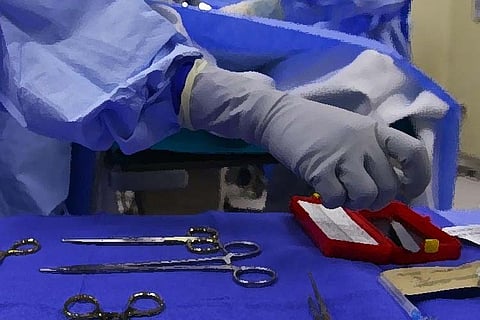

Bibiche Tshibola Makolo, a 39-year-old woman from the Democratic Republic of Congo (DRC), came to Fortis Hospital in Bengaluru in February, looking for a doctor who could perform an open heart surgery that she required. The challenge? Bibiche belongs to the Jehovah’s Witness faith, which does not allow for followers to undergo blood transfusions. Considering all possibilities, doctors ultimately decided to take her up for a ‘bloodless surgery’.
“We’ve done bloodless surgeries several times before and are familiar with the process. Many patients of this faith come to us and require us to take them up for bloodless surgeries,” says Dr Murali Chakravarthy, Director, Department of Anaesthesia, Fortis Hospital, Bengaluru. He further went on to explain that several patients who come from this particular religious background often seek out doctors experienced with bloodless surgeries so that they are able to avail treatment while holding onto their faith. “We must honour the wishes of patients wherever possible, regardless of any personal beliefs we may harbour. And in this case, it is important to note that bloodless surgeries may have less risk than the traditional method,” adds the doctor.
So what exactly is a ‘bloodless’ surgery?
In the early 1900s, Adolf Lorenz, an orthopaedic surgeon from Vienna, Austria, began conducting ‘dry surgeries’ in which he would not cut into the skin or tissue of patients, after it was found that he was allergic to carbolic acid, a compound that was excessively utilised in operating rooms. As a result, he was limited to performing procedures which were non-invasive in nature, earning him the nickname ‘The Bloodless Surgeon of Vienna.’
While the modern-day meaning of a bloodless surgery has changed since the time of Lorenz, and encompasses both invasive and non-invasive surgical techniques today, it does not refer to a procedure in which no blood is involved. A bloodless procedure today refers to one in which any allogeneic blood (blood which comes from a genetically non-identical donor) is not used.
Today, a bloodless surgery refers to one in which a patient is not given any blood transfusion prior to or during the surgery. Instead, several alternative measures are used to ensure that a patient’s haemoglobin levels are normal before the surgery, where adequate intravenous (IV) fluids are given during the surgery to compensate for any fluid volume loss.
“Often, transfusions can pose certain risks for patients, especially ones going in for major surgeries. What needs to be kept in mind is that a blood transfusion is just like any other transplant. It is not just a simple IV fluid that is given. There are chances of any antigen-antibody, that is graft versus host, reactions occurring,” explains Dr Murali, referring to the possible outcome of allergic reactions in a blood transfusion. “A biological signature of someone else remains in your body, this is something that we cannot ignore. There is enough medical evidence to show that a blood transfusion is not always needed for a patient.” He further notes that blood transfusions also pose risks for some people who develop cancer and may impact their chances of their survival.
Bibiche’s open heart surgery
In the case of Bibiche, she had to undergo an open heart surgery for a valve repair due to the extensively restrictive cardiomyopathy she was diagnosed with.
Cardiomyopathy can occur due to one of several reasons, but the general pathology is that the heart muscle becomes enlarged and rigid. In some cases, especially if it has been a chronic issue, there might even be a chance that some of the muscle is slowly replaced with scar tissue, as a result of the damage to the muscle.
A team of doctors, led by Dr Vivek Jawali, Chief Cardiothoracic and Vascular Surgeon, as well as Chairman of the Department of Cardiovascular Sciences at Fortis Hospitals in Bengaluru, and Dr Murali Chakravarthy, Director of the Department of Anaesthesia at the same hospital, took Bibiche up for surgery. Following the procedure, she was started on several medications to help maintain her haemoglobin levels, among other things. A month after the surgery, she is back at home in DRC and is doing well.